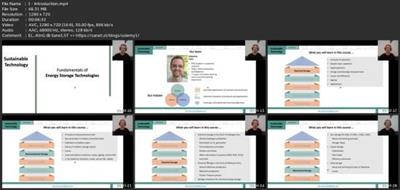M
0

Energy Storage Technologies - From Chemistry To Engineering
Published 10/2022
MP4 | Video: h264, 1280x720 | Audio: AAC, 44.1 KHz
Language: English | Size: 4.55 GB | Duration: 9h 54m
A Breakdown of Key Aspects and a Comprehensive Look into the Chemistry, Economics and Engineering of Energy Storage
Published 10/2022
MP4 | Video: h264, 1280x720 | Audio: AAC, 44.1 KHz
Language: English | Size: 4.55 GB | Duration: 9h 54m
A Breakdown of Key Aspects and a Comprehensive Look into the Chemistry, Economics and Engineering of Energy Storage
What you'll learn
Principles of energy storage technologies
Chemical, physical, engineering and economic aspects of energy storage
Electrical energy storage necessities and definitions
In-depth understanding of selected storage technologies
Electrochemical Energy Storage - Battery technology
Chemical Energy Storage - (Green) production of chemical fuels
Mechanical Storage - Gas, liquid, solid storage methods
Thermal Storage - Sensible, latent, thermochemical technologies
Requirements
A desire to think outside the box and towards application
Basic nomenclature and concepts of chemistry and physics (helpful)
High-school maths to understand formulas
Description
You are a professional, a student, a teacher or just interested in general in the principles of Energy Storage? Then this is the right course for you!In this course, we will cover various concepts, reactions and applications of various Energy Storage Technologies. For this purpose we will start at the very beginning, picking you up and introducing into some fundamental concepts of each technology. Depending on the Energy Storage, we will cover additional aspects of Chemistry, Physics, Engineering and Economics surrounding every topic.The concept of this course is not to only give textbook explanations to things and to explain models. Instead it aims at using your knowledge to understand the bigger picture and apply the knowledge you gained by looking at real life applications.The curriculum of this course will allow you a step-by-step introduction by covering the following topics:Introduction - In this chapter we will talk about the origin of energy storage, fossil fuels, the carbon cycle, classification and key parameters of energy storage technologiesElectrical Energy Storage - You will learn how electrical energy storage with capacitors works. We will start with the very basics of physics and work our way to understanding more complex systems like double-layer capacitors and supercapacitors, their characteristics, efficiency, ageing and applicationElectrochemical Energy Storage - We will discuss the principles of electrochemical cells and their setup, define key parameters of battery cells, losses and have an in-depth look into the processes happening in Lead-acid batteries and Li-ion batteries.Chemical Energy Storage - This chapter will cover various aspects of (green) hydrogen and (green) methane production. We will dive into conventional processes, electrolysis and carefully wage advantages and disadvantages of individual energy carriers. Furthermore, Fuel Cells and possible storage methods for these kind of fuels will be covered.Mechanical Energy Storage - Looking into various methods storage by means of gas, liquid and solids we will focus on the working principle, advantages and disadvantages as well as application areas of compressed air energy storage, pumped water storage and flywheels.Thermal Energy Storage - In this section we will discuss fundamental concepts of heat transfer and storage using sensible, latent or thermochemical storage methods.Finishing this course, you will be able to talk about the operational principle of various Energy Storage Technologies, employed materials, explain which parameters influence their operation and where they can be found / applied!
Overview
Section 1: Introduction
Lecture 1 Introduction
Lecture 2 Origin of Energy Storage
Lecture 3 Fossil Fuels and the Carbon Cycle
Lecture 4 Necessity of Energy Storage
Lecture 5 Definitions and Sectoral Storage
Lecture 6 Classification of Energy Storage I
Lecture 7 Classification of Energy Storage II
Lecture 8 Classification of Energy Storage III
Section 2: Electrical Energy Storage
Lecture 9 Physics of Capacitors
Lecture 10 Energy Storage in Capacitors
Lecture 11 Principle of a Double-Layer Capacitor
Lecture 12 Concept of Charging and Discharging
Lecture 13 Pseudocapacitance
Lecture 14 Physics of Charging and Discharging I
Lecture 15 Physics of Charging and Discharging I
Lecture 16 Efficiency, Losses and Ageing
Lecture 17 Application of Supercapacitors: Comparison to other Technologies
Lecture 18 Application of Supercapacitors: Current Technologies
Section 3: Electrochemical Energy Storage
Lecture 19 Introduction to Redox Reactions
Lecture 20 Voluntary (Discharging) and Involuntary (Charging) Reactions
Lecture 21 Nernst Equation
Lecture 22 Current and Capacity
Lecture 23 Key Characterization Parameters
Lecture 24 Charge and Discharge Characteristics
Lecture 25 Primary and Secondary Batteries
Lecture 26 Battery Setup
Lecture 27 Losses: Activation Polarization, Ohmic Losses
Lecture 28 Losses: Concentration Polarization (Mass Transport)
Lecture 29 Lead-acid Battery: Introduction
Lecture 30 Lead-acid Battery: Chemical Reaction Insights
Lecture 31 Lead-acid Battery: Side-reactions
Lecture 32 Lead-acid Battery: Service Life
Lecture 33 Li-ion Battery: Introduction
Lecture 34 Li-ion Battery: Chemical Reaction Insights
Lecture 35 Li-ion Battery: Dendrites
Lecture 36 Li-ion Battery: Commercial Electrodes
Lecture 37 Li-ion Battery: Electrode Requirements
Lecture 38 Li-ion Battery: Electrolyte
Lecture 39 Li-ion Battery: Separator
Lecture 40 Li-ion Battery: Commercial Cells - Coin Cells and Cylindrical Cells
Lecture 41 Li-ion Battery: Commercial Cells - Prismatic Cells and Pouch Cells
Lecture 42 Li-ion Battery: Safety
Lecture 43 Li-ion Battery: Effect of Discharge Speed and Temperature
Lecture 44 Li-ion Battery: Ageing and Degradation
Lecture 45 Li-ion Battery: Cost
Lecture 46 Li-ion Battery: System Comparison
Section 4: Chemical Energy Storage
Lecture 47 Carbon-neutral Chemical Energy Storage
Lecture 48 Advantages and Disadvantages of Hydrogen
Lecture 49 Hydrogen Production
Lecture 50 Thermochemical Processes for Hydrogen Production
Lecture 51 Photolytic and Electrolytic Processes for Hydrogen Production
Lecture 52 Introduction to Electrolysis and Fuel Cells
Lecture 53 Thermodynamics of Water Splitting
Lecture 54 Water Electrolysis - pH dependency
Lecture 55 Kinetics - Origin of Losses
Lecture 56 Kinetics - Remediation of Losses
Lecture 57 Atmospheric / Anion Exchange Membrane (AEM) Electrolysis
Lecture 58 Membrane Electrolysis (PEM, PEMEL)
Lecture 59 High Temperature Electrolysis of Steam (HTES)
Lecture 60 Fuel Cells and Electrolyzers - Parallels and Differences
Lecture 61 Fuel Cell Setup and Types
Lecture 62 Methane Advantages and Disadvantages and Chemical Methanation
Lecture 63 Biological Methanation
Lecture 64 Methanol Synthesis
Lecture 65 Fischer-Tropsch Process (FT)
Lecture 66 Gaseous Storage Media
Lecture 67 Underground Gas Storage Media
Lecture 68 Liquid and Solid Storage Media
Lecture 69 Hydrogen Storage
Section 5: Mechanical Energy Storage
Lecture 70 Gaseous Media: Principle and Storage Types
Lecture 71 Diabatic Compressed Air Energy Storage (D-CAES)
Lecture 72 Adiabatic Compressed Air Energy Storage (A-CAES)
Lecture 73 Isothermal Compressed Air Energy Storage (I-CAES)
Lecture 74 Liquid Air Energy Storage (LAES)
Lecture 75 Storage Containers for Gaseous Media
Lecture 76 Liquid Media: Principle and Parameters
Lecture 77 Types of Liquid Media Storage Facilities
Lecture 78 Liquid Media: Efficiency, Losses and Applications
Lecture 79 Liquid Media: Advantages and Disadvantages
Lecture 80 Solid Media: Principle and Parameters
Lecture 81 Flywheel Concept and Setup (Mechanical Battery)
Lecture 82 Losses and Applications of Flywheels
Lecture 83 Advantages and Disadvantages of Flywheels
Section 6: Thermal Energy Storage
Lecture 84 Storage Principle and Categories
Lecture 85 Heat Transfer Mechanisms
Lecture 86 Sensible Thermal Storage
Lecture 87 Latent Thermal Storage
Lecture 88 Principle of Thermochemical Storage
Lecture 89 Types of Thermochemical Storage Reactions
Lecture 90 Summary - Material Requirements and Cost
Section 7: Summary
Lecture 91 Storage Technology Comparison
Anyone who is interested in basic principles of Energy Storage,Anyone who wants to gain a broader understanding of chemical, physical, engineering and economic aspects of the Energy Storage Industry,Anyone who is interested in Renewable Energies,Anyone who aims to review and broaden their knowledge in material engineering and chemistry

Download link
rapidgator.net:
You must reply in thread to view hidden text.
uploadgig.com:
You must reply in thread to view hidden text.
nitroflare.com:
You must reply in thread to view hidden text.
1dl.net:
You must reply in thread to view hidden text.



